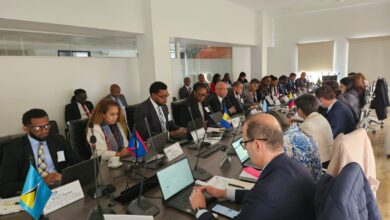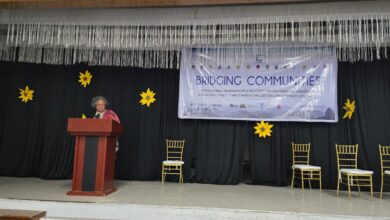Colleague Ministers
Mr. Secretary-General
Government Officials
Members of Staff of the Secretariat
Ladies and Gentlemen of the Media
A warm welcome to my colleague Ministers. Please accept my best wishes for the New Year and a pleasant stay in Guyana.
I would like to single out the “New Kids' on the block for special mention and to wish them every success as they go about their day to day activities at home and abroad.
I refer to KD and Ken from Jamaica and Trinidad and Tobago respectively. You have joined “Club COTED” at a time when every ounce of skill, experience and energy is needed to assist the COTED to grapple with the challenges ahead and to identify the opportunities that can redound to the benefit of our people.
This is COTED's first meeting since Doha and the events of September 11, 2001 in the United States. It is not by chance therefore that these two issues are to be found on the Agenda of this Twelfth COTED. The latter has been discussed by our Heads of States and Government at their Special (Emergency) Meeting held last October in the Bahamas.
Ours is the task to identify
“The measures to safeguard the Region's trade and economic interests in the face of a down turn in the world economy which was booming even before the terrorist attacks” (Overview – Draft Report on the Emergency Meeting)
As regards the 4th WTO Ministerial, our small numbers and low levels of representation in some cases notwithstanding we did make a big impact at Doha and came through with flying colours. While we must be proud about our achievements in influencing the outcome at Doha, we must not rest on our laurels.
We are living in trying times and our work is cut out for us. The road map is clear but whether we have the instruments to navigate our way successfully through the surmounting difficulties that lie ahead. At the same time there is a greater coincidence of views and positions between NGOs and Governments of developing countries. Without the NGOs, the recent TRIPS and public health success would not have been possible. We should build alliances here too. But equally important is our own national capacities to take on the challenge that lie ahead.
The success to reliable and sustainable trade policy is to have the administrative capacity and expertise in place to translate that policy into pro-active, informed and focused activities at home and abroad.
If trade is to be central to the Region's growth strategies ,and the GATT used to negotiate market access and to defend ourselves against non-tariff barriers it is imperative that we have competent, informed and well-resourced trade policy operations in our respective jurisdiction. In addition, we need this capacity to enable our countries to be in a position to :
•identify market opportunities -niches etc. wherever they may be available;
•negotiate trade agreements that will boost our countries economic and social development and to increase job opportunities.
In this regard, the analysis of our trade flows show that there is little or no exports from CARICOM to Latin America and Central America. It is our expectation that CARICOM-Colombia, the CARICOM-Dominican Republic and CARICOM-Cuba Trade Agreements will open up greater market access for our products in those Regions.
New possibilities will open up also with the CARICOM-Canada Trade Agreement. In this regard, a potential area for a dynamic engagement is trade in Services. However, the Canadians appear to be concerned about the many restrictions still in place in the services sector in CARICOM. It is for this reason that finalising Protocol II is critical to investment possibilities, not to mention the success of the Single Market and Economy.
As we continually seek to diversify our exports we remain hamstrung by the fact that most of us continue to be commodity producers and price takers on the international market. This situation is compounded by the fact that existing preferences for our traditional exports to Europe are likely to end by 2008.
And as if to “add salt to the wound” a new challenge has surfaced from within the US, where recently Congress approved Trade Promotion Authority or “Fast Track Authority” has imposed stricter enforcement of trade laws for textiles where all US kit and woven fabrics will be required to undergo all dyeing, finishing and printing procedures in the US in order to qualify for benefits under the existing CBI.
In effect, this decision by the US Congress not only welches the Caribbean Basin Trade Partnership Act, but also imposes stricter rules of origin for preferential imports of Caribbean goods under the CBI into the US.
Caribbean exporters and re-exporters of raw fabric into the US market need to take note of this new development and make the necessary adjustments, where necessary.
We may not be able to press the US to change its trade laws, but the US cannot be talking about trade liberalisation when certain industries remain heavily subsidised and when millions of dollars are spent on lobbying and influence peddling on Capitol Hill to keep us out from that market.
Modernisation of our traditional export industries must go hand in hand with the pace of trade liberalisation.
Given that our traditional exports will face difficulties in the not too distant future we should focus on those non-traditional products which have already developed experience as regard competitiveness at the regional and global levels.
Also we have to see this process in the context of the FTAA negotiations where product by product negotiations will soon commence in the Market Access Working Group.
In this connection, it is important that regional policy makers appreciate the inter-action and inter-connection between market access, negotiating of tariffs and the Working Group on Agriculture.
The overarching challenge however is the imminent negotiations at the WTO which was agreed in Doha on the basis of the Work Programme.
But there is one issue here that should be of interest to COTED, and that is to ensure that the decision on capacity building is implemented. I share the view that were this not to happen the next WTO Ministerial Meeting may prove to be a difficult one.
And we need to let the donors know of our dissatisfaction with the slow pace of delivery coupled with the burdensome paper work and bureaucratic procedures that are required before urgently needed technical assistance for capacity building and institutional strengthening is provided.
Colleagues, I remain convinced about the developmental approach to trade liberalisation.
The pace of trade liberalisation mut go hand in hand with a range of domestic, social and economic measures, as well as institutional and capacity building aimed at promoting and enhancing human development. The “local heresies” must be fully ventilated and tested.
And all the talk about emulating the Singapore Model must be placed in proper perspective. High tariff walls, import substitution and protectionism at a time when the WTO did not exist helped the Far East Tigers succeed. There is no gainsaying that some of us did make mistakes along the way.
Colleagues, we have one, long, full day ahead of us. Enough has been said by way of speech making. Let us now roll up our sleeves or whatever and get down to work.
I thank you.





